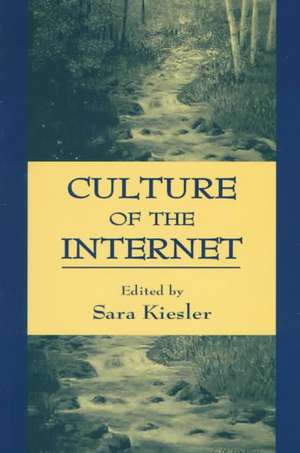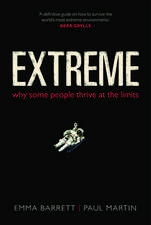Culture of the Internet
Editat de Sara Kiesleren Limba Engleză Paperback – apr 1997
The authors of these chapters work in different disciplines and have different goals, research methods, and styles. For some, the emergence and use of new technologies represent a new perspective on social and behavioral processes of longstanding interest in their disciplines. Others want to draw on social science theories to understand technology. A third group holds to a more activist program, seeking guidance through research to improve social interventions using technology in domains such as education, mental health, and work productivity. Each of these goals has influenced the research questions, methods, and inferences of the authors and the "look and feel" of the chapters in this book.
Intended primarily for researchers who seek exposure to diverse approaches to studying the human side of electronic communication and the Internet, this volume has three purposes:
* to illustrate how scientists are thinking about the social processes and effects of electronic communication;
* to encourage research-based contributions to current debates on electronic communication design, applications, and policies; and
* to suggest, by example, how studies of electronic communication can contribute to social science itself.
Preț: 512.02 lei
Preț vechi: 602.37 lei
-15% Nou
Puncte Express: 768
Preț estimativ în valută:
97.97€ • 106.76$ • 82.56£
97.97€ • 106.76$ • 82.56£
Carte tipărită la comandă
Livrare economică 23 aprilie-07 mai
Preluare comenzi: 021 569.72.76
Specificații
ISBN-13: 9780805816365
ISBN-10: 0805816364
Pagini: 480
Dimensiuni: 152 x 229 x 29 mm
Greutate: 0.77 kg
Ediția:1
Editura: Taylor & Francis
Colecția Psychology Press
Locul publicării:Oxford, United Kingdom
ISBN-10: 0805816364
Pagini: 480
Dimensiuni: 152 x 229 x 29 mm
Greutate: 0.77 kg
Ediția:1
Editura: Taylor & Francis
Colecția Psychology Press
Locul publicării:Oxford, United Kingdom
Public țintă
ProfessionalCuprins
Contents: S. Kiesler, Preface. Part I:The Net as It Was and Might Become. J. King, R.E. Grinter, J.M. Pickering, The Rise and Fall of Netville: The Saga of a Cyberspace Construction Boomtown in the Great Divide. L. Sproull, S. Faraj, Atheism, Sex, and Databases: The Net as a Social Technology. M.D. Mehta, D.E. Plaza, Pornography in Cyberspace: An Exploration of What's in USENET. J. Manning, W. Scherlis, S. Kiesler, R. Kraut, T. Mukhopadhyay, BOX: Erotica on the Internet: Early Evidence From the HomeNet Trial. Y.M. Binik, J. Cantor, E. Ochs, M. Meana, From the Couch to the Keyboard: Psychotherapy in Cyberspace. Part II:Electronic Groups. N.K. Baym, Interpreting Soap Operas and Creating Community: Inside an Electronic Fan Culture. P. Curtis, Mudding: Social Phenomena in Text-Based Virtual Realities. S. Turkle, Constructions and Reconstructions of Self in Virtual Reality: Playing in the MUDs. K.D. Mickelson, Seeking Social Support: Parents in Electronic Support Group. B. Wellman, An Electronic Group Is Virtually a Social Network. Part III:Power and Influence. C.R. Kedzie, A Brave New World or a New World Order? P.J. Carnevale, T.M. Probst, Conflict on the Internet. R. Kling, BOX: Coordination, Control, and the Intranet. Part IV:Computer-Supported Cooperative Work. T. Connolly, Electronic Brainstorming: Science Meets Technology in the Group Meeting Room. S. Whittaker, C. Sidner, E-mail Overload: Exploring Personal Information Management of E-mail. W. Thorngate, BOX: More That We Can Know: The Attentional Economics of Internet Use. Part V:Networked Organizations. D. Constant, L. Sproull, S. Kiesler, The Kindness of Strangers: On the Usefulness of Electronic Weak Ties for Technical Advice. R.E. Kraut, P. Attewell, Media Use in a Global Corporation: Electronic Mail and Organizational Knowledge. L. Covi, R. Kling, Organizational Dimensions of Effective Digital Library Use: Closed Rational and Open Natural Systems Models. J.W. Schofield, A. Davidson, J.E. Stocks, G. Futoran, The Internet in School: A Case Study of Educator Demand and Its Precursors. Part VI:Differences in Access and Usage. J.P. Walsh, T. Bayma, Computer Networks and Scientific Work. T.K. Bikson, C.W.A. Panis, Computers and Connectivity: Current Trends.
Recenzii
..."Kiesler's (book) is more likely to be used by readers extracting data. [This] book is recommended for all academic libraries, because each brings something significant to the important topic of Internet culture."
—CHOICE
"This interesting collection of contributed chapters explores several unique aspects of the Internet in terms not of technological innovation but of social and cultural phenomena."
—Journal of the American Society for Information Science
"Do we need another book about the Internet? I think we need Sara Kiesler's book. It delivers on Kiesler's promise to present a diverse collection of essays and research reports on the new social technology. And it inspires additional research from the multiple perspectives within social science."
—Contemporary Psychology
"This diverse collection of early work provides useful examples of how studies of electronic communication can contribute to social science research."
—Applied Cognitive Psychology
"Kiesler's introductions to the book sections are thoughtful and comprehensive, providing further references for understanding the research traditions from which the articles spring."
—Convergence
—CHOICE
"This interesting collection of contributed chapters explores several unique aspects of the Internet in terms not of technological innovation but of social and cultural phenomena."
—Journal of the American Society for Information Science
"Do we need another book about the Internet? I think we need Sara Kiesler's book. It delivers on Kiesler's promise to present a diverse collection of essays and research reports on the new social technology. And it inspires additional research from the multiple perspectives within social science."
—Contemporary Psychology
"This diverse collection of early work provides useful examples of how studies of electronic communication can contribute to social science research."
—Applied Cognitive Psychology
"Kiesler's introductions to the book sections are thoughtful and comprehensive, providing further references for understanding the research traditions from which the articles spring."
—Convergence














